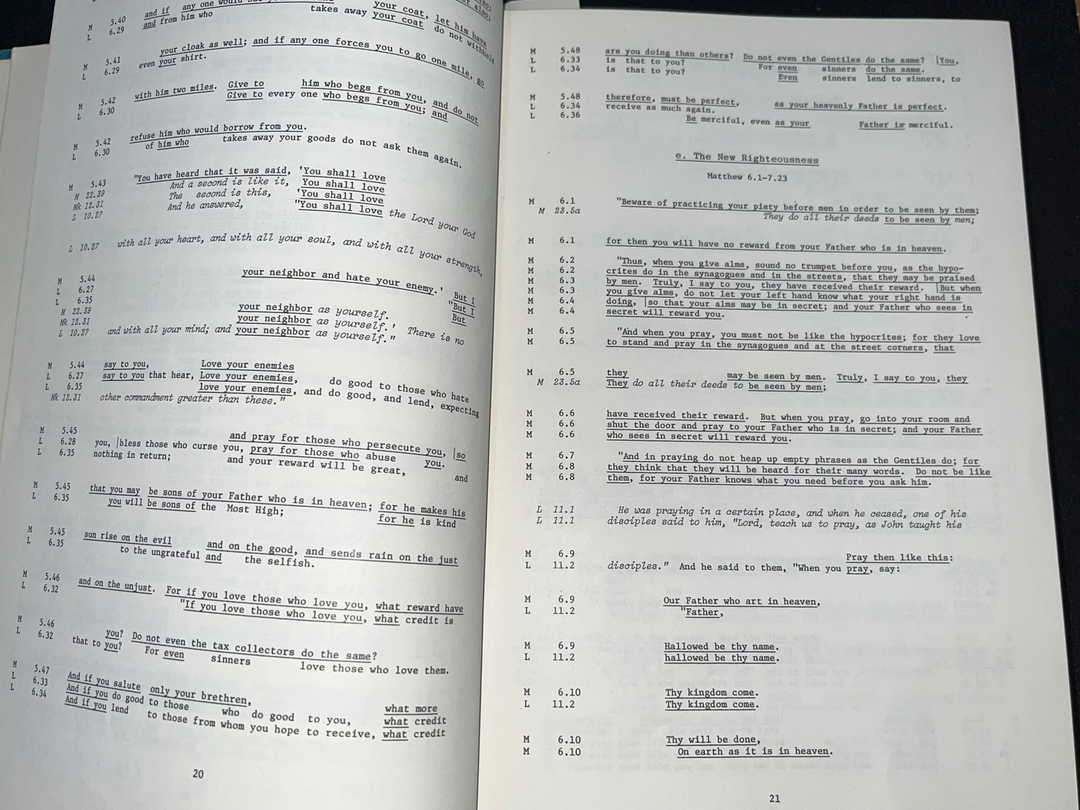There are Two Versions of the Lord’s Prayer
Every week we pray the Liturgy version of the “The Lord’s Prayer” as part of our Worship Service. But did you know that there are two different versions of the prayer found in Matthew and Luke? Did you know that the Lord’s Prayer is absent from the Gospel of Mark and John?
From the table below, the Liturgy — commonly recited version — is based on Matthew 6:9-13[^1] with additional Doxology (closing). Most Protestant Churches include the Doxology while Catholic and Orthodox Churches do not recite the ending.
| Liturgy | Matthew 6:9-13 | Luke 11:2-4 |
|---|
Our Father, who art in heaven
hallowed be thy name,
thy kingdom come,
thy will be done,
on earth as it is in heaven.
Give us this day our daily bread;
and forgive us our trespasses,
as we forgive those
who trespass against us;
and lead us not into temptation,
but deliver us from evil.
For thine is the kingdom,
and the power, and the glory,
forever and ever. Amen. | Our Father who art in heaven,
Hallowed be thy name,
Thy kingdom come,
Thy will be done,
On earth as it is in heaven.
Give us this day our daily bread;
And forgive us our debts,
As we also have forgiven our debtors;
And lead us not into temptation,
But deliver us from evil. | Father,
hallowed be thy name,
Thy kingdom come.
Give us each day our daily bread;
And forgive us our sins,
for we ourselves forgive every one who is indebted to us;
and lead us not into temptation. |
Differences between Matthew’s and Luke’s version of the Lord’s Prayer
These are differences identified in The Horizontal Line Synopsis of the Gospels by Reuben J. Swanson.
| Part | Matthew 6:9-13 | Luke 11:2-4 |
|---|
| Opening | 6.9 “Our Father, who art in heaven” | 11.2 “Father” |
| Petition on God’s Will | 6.10 “Thy will be done, On earth as it is in heaven. | Omitted |
| Petition for Daily Bread | 6.11 “Give us this day our daily bread;“ | 11.3 “Give us each day our daily bread;“ |
| Forgiveness Petition | 6.12 “And forgive us our debts,”
6.12 “As we also have forgiven our debtors;“ | 11.4 “And forgive us our sins
11.4 “for we ourselves forgive every one who is indebted to us;“ |
| Final Petition | 6.13 “but deliver us from evil.” | 11.4 “And lead us not into temptation.” |
| Doxology (Ending) | Does not appear in the oldest manuscripts of Matthew
(The familiar ending: “For yours is the kingdom and the power and the glory forever. Amen.” was added later in some Greek manuscripts and appears in translations like the King James Version, likely based on early liturgical use). | Omitted. |
Why are there Differences?
Differences may exist for several reasons. While the authors of Matthew and Luke wrote the books independent of each other, the books are based on Mark’s manuscript (the first Gospel written) with revisions and additions that Mark may have missed or have not heard during the Oral Tradition. (The Oral Tradition is the time period the Gospel was spread orally before it was written down in a manuscript.) That is, the authors of Matthew and Luke may have been exposed to different versions of the prayer.
The important thing to remember is that is not that they are different — or the Liturgy is different — is that our Lord and Saviour Jesus Christ taught us to pray.
Pray every day, do God’s will, pray for our Daily Bread, ask for forgiveness and forgive others, give us direction to stay the path to righteousness.
[^1] Swanson, Reuben j., The Horizontal Line Synopsis of the Gospels, pages 21-22.
